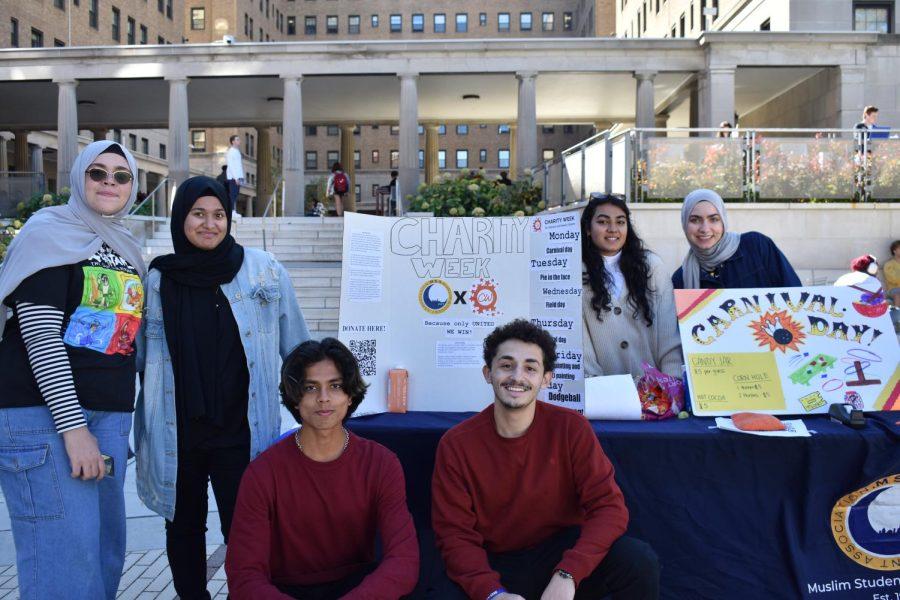‘Only united do we win:’ Pitt MSA hosts its second annual Charity Week
Alyssa Carnevali | Staff Photographer
Members of Pitt’s Muslim Student Association at a charity week fundraiser by the William Pitt Union on Monday.
October 25, 2022
For Nora Alobedi, a junior biology major, Charity Week represents a time of unity. She said each event hosted by Pitt’s Muslim Student Association further displays that unity, whether it be the dodgeball tournament or carnival day.
“There is no ‘I’ in team,” Alobedi said. “Obviously, we all know that phrase. But only united do we win. That speaks louder than anything else. When we are united, we are the most powerful we could ever be in Charity Week.”
Pitt’s MSA is hosting its second annual Charity Week this week to raise funds for countries and orphans in need. Pitt raised $12,000 last year, the third-highest amount in the nation compared to other MSA organizations.
Alobedi, one of the task force members for Charity Week, said the club is striving to raise more this year after their success last year.
“The more that we can [are] able to raise, the better,” Alobedi said. “Last year, there was no goal for how much money to raise. We were just doing it to see what we could do and we raised up to $12,000, which is amazing. We saw that if there’s a potential to raise that much, we can do more. We can do better.”
According to its website, Charity Week is an international project that promotes social engagement and unity under shared Islamic and humanitarian beliefs. Charity Week partners with several universities around the world to host fundraisers that provide aid to children and orphans in other countries. The three main categories that the money will go toward this year are education, hunger and malnutrition and emergency relief for catastrophes such as the floods in Pakistan.
Pitt’s MSA is hosting a fundraising event every day of the week. Each day has its own theme, including field day, carnival day and dodgeball day. All events will be held at the William Pitt Union Plaza from noon to 4 p.m., except for the dodgeball tournament which will take place on Saturday at the Sports Dome from 2-5 p.m.
MSA officers across the nation also take part in recruiting other universities to participate in Charity Week. Each MSA city is designated with a “leader” that is responsible for reaching out to other universities and spreading awareness. Mansour Elsharawy, the Pittsburgh leader and a senior at Carnegie Mellon University, said his goal is to get as many institutions as possible to participate in Charity Week. He said Charity Week originated in the United Kingdom, but now almost 10 countries are involved.
“My title is Pittsburgh Lead, which has the focus on Pittsburgh MSA institutions,” Elsharawy said. “But we’ve also decided to expand into Ohio, Kentucky and West Virginia. There are a bunch of MSAs there and they are taking part in Charity Week for the first time this year. It’s really cool to watch them do it for the first time.”
Each university MSA that fundraises for Charity Week is responsible for sending the money to the organization once the week ends. Charity Week has a finance team that processes all the payments received and later sends the money to Islamic Relief, the organization responsible for distributing the money to different projects.
Beyza Tuncer, a senior biology major, said although this charity event seems like a competition among schools in the nation to raise the most money, the ultimate mission is to help children in different nations.
“It is important to know that 100% of the money is sent to children around the world, so they can have a more sustainable future,” Tuncer said. “It’s important that we as a community all come together and spread awareness for the cause. The whole premise is that the money goes to the country that needs it the most during that specific time.”
According to the website, Charity Week has a survey where people can vote on where they want the funds to go. The countries receiving the money in 2022 are predominantly in Africa and Asia, such as Somalia and Afghanistan.
Elsharawy said MSAs across the nation do not set a concrete goal on how much they want to raise. He said Charity Week doesn’t pressure anybody to raise the most money but rather promotes unity and engagement.
“We do not have a goal for how much we want to raise and that’s what makes it so special,” Elsharawy said. “We don’t look at metrics or benchmarks. I have never heard a single person say ‘We raised two million last year, so we have to raise three million this year.’ The main thing we care about most is unity among all the embassies and institutions. We care about the fact that all of our participants are involved and engaged.”



